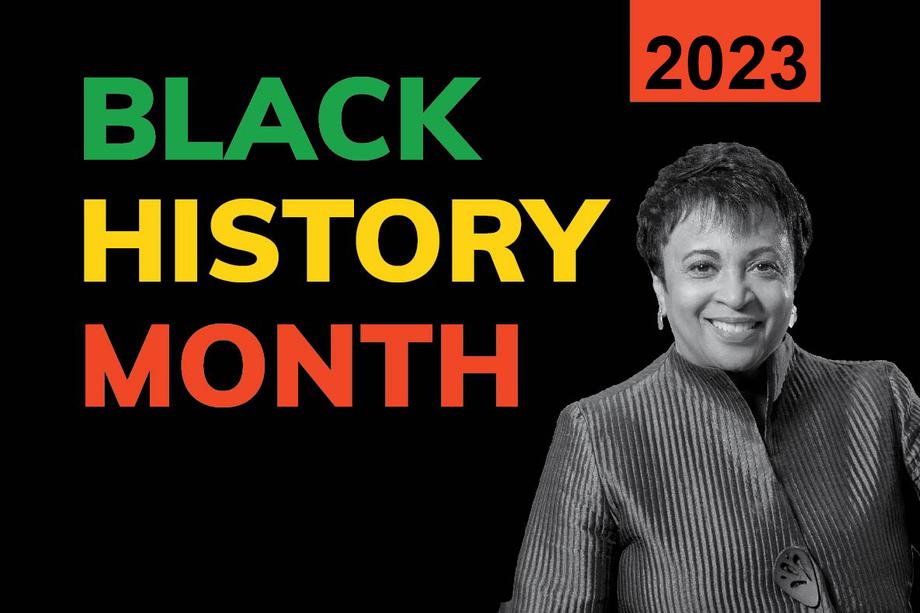Celebrating Black history: Building a ‘people’s library’
February 1, 2023
When people ask Carla Hayden about the significance of being the first Black woman to lead the Library of Congress, the largest library in the world, she often references a moment from Frederick Douglass’s life when he was just 11 or 12 years old.
That was when Douglass's enslaver, Hugh Auld, discovered that Douglass was learning the alphabet.
Auld had learned his wife was teaching Douglass, and he told her, ‘Don’t do that,’” Hayden recalled to CBS News in 2020. “That’s when Frederick Douglass knew reading must be important.”
If he learned to read, Douglass overheard Auld say, the knowledge would “forever unfit him” to be enslaved.
Historic appointment
For Hayden, who’s had a long career as a professional librarian and community leader, this legacy of violence and suppression imbues her leadership with personal meaning.
“As a descendant of people who were denied the right to read — who were punished with lashes and worse for learning — to now have the opportunity to serve and lead the institution that is the national symbol of knowledge is a historic moment,” she noted during her 2016 swearing-in ceremony.
In interviews, Hayden occasionally makes reference to Alberto Manguel’s book “A History of Reading,” where he writes: “As centuries of dictators have known, an illiterate crowd is the easiest to rule; since the craft of reading cannot be untaught once it has been acquired, the second-best recourse is to limit its scope.”
Resisting limitations
Though Frederick Douglass himself is attributed with having said that “once you learn to read, you’ll be forever free,” the pathway to obtaining equitable access has never been linear — rather, as the scholar Shaundra Walker put it in her essay on the provision of academic library buildings for Black colleges, racial progress in libraries often sputters back and forth.
In the early 1900s, Black Americans were kept out of public libraries across the country, including Carnegie branches that were supposed “palaces for the people,” while the “separate but equal” policies of Plessy v. Ferguson ushered in the construction of facilities that were underfunded and inferior to those offered to white people.
In the face of this, and with public attention brought forth by scholars such as W.E.B. DuBois, Black activists would succeed in securing funds to build libraries for and by Black Americans, with autonomous control, in places like Houston, Louisville, and Charlotte, decades before desegregation.
And as Jim Crow laws endured in the 1960s, college students would lead the fight for equal access to main library branches by staging “read-ins'' at the locations that denied them access. The groups of students known as the Tougaloo Nine in Jackson, Mississippi, and the Greenville Eight in South Carolina, were arrested for the carefully planned act of quietly reading library books in those main branches. After arrests in Jackson, subsequent peaceful protests were met by local police with tear gas and dogs, and in Greenville, the mayor shut down both white and Black branches rather than accept court-ordered integration.
Despite attempts to suppress them, these read-ins and demonstrations did have an effect on moving the needle of justice forward. In Greenville, legal and public pressure would prompt the mayor to reopen both branches of the library and — though he did not state so directly, as George Eberhart writes in American Libraries magazine — they would thereafter be integrated. In South Carolina, Black student activists’ efforts led to a class action lawsuit filed by the NAACP that led to the Jackson Public Library’s desegregation in 1962.
Continuing the work
Under Hayden, the Library of Congress has created new opportunities for stories that have not been traditionally told, valued, or preserved, with fellowships, residencies, and training programs open to underrepresented artists and activists who want to explore or add their work to the library’s holdings.
Emblematic of Hayden's belief that the Library of Congress ought to be the people's library was her Twitter invitation to singer and flutist Lizzo, who subsequently became the first person known to have played the library's precious crystal flute — a gift to James Madison on his second inauguration as president.
When Lizzo also demonstrated the flute onstage during a concert, Hayden tweeted, "This makes my heart swell."
“Libraries are a cornerstone of democracy,” Hayden told Ms. Magazine in 2003, “where information is free and equally available to everyone. People tend to take that for granted, and they don’t realize what is at stake when that is put at risk.”
Twenty years later, in the face of a surge in book bans across the United States that openly seeks to suppress the stories and histories of BIPOC, LGBTQ+, and other marginalized people, Hayden's words resonate more than ever.

Librarian of Congress Carla Hayden.